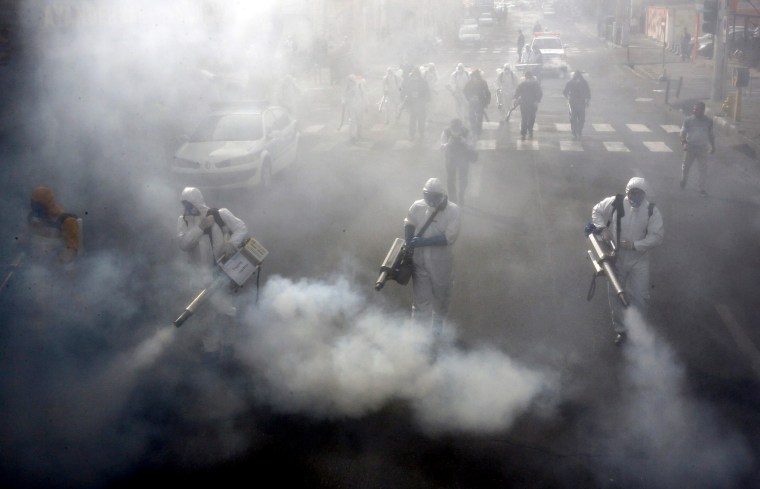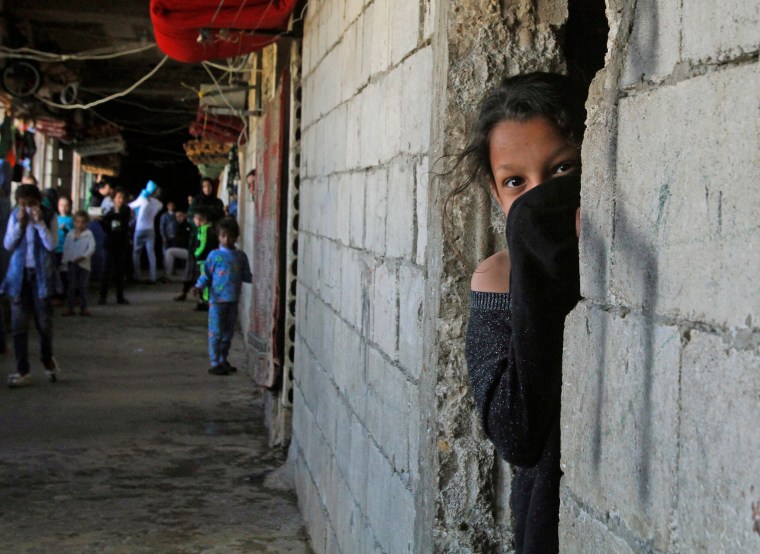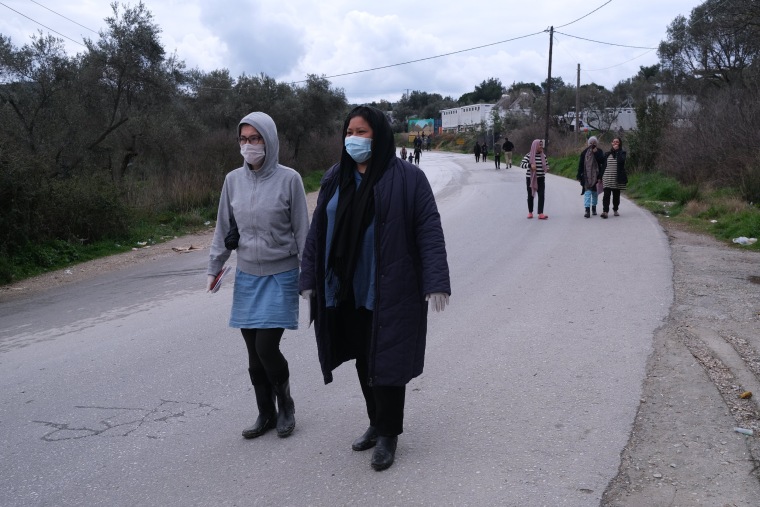WASHINGTON — The coronavirus outbreak threatens to inflict "carnage" on refugees around the world who often live in cramped conditions, lack access to clean water and are in countries with failing or stretched medical systems, humanitarian aid groups say.
From Syria to Bangladesh to Uganda, the risk posed to people who have fled war and persecution is potentially dire, and only urgent international action can avert a catastrophe, aid organizations told NBC News.
As of Tuesday, only 10 cases had been reported among refugees and displaced persons, and all of those were patients in Germany, according to the U.N. refugee agency. But in the absence of extensive testing at refugee camps in the Middle East, Africa or Asia, it's unclear whether the fast-moving virus has already reached them, medical experts and humanitarian workers said.
"We don't know, and that's largely because we haven't done any testing," said Muhammad Zaman, a professor of bioengineering at Boston University. "We need to know how acute the problem is before we come up with an intervention."

Given the fast-moving nature of the epidemic, if COVID-19 hasn't already spread to refugees, it's only a matter of time, Zaman added.
Beyond the potentially tragic consequences for refugees, failing to counter the spread of the virus among large refugee communities near the border of Europe or elsewhere could undercut any success in containing the outbreak and enable it to spread further, aid officials said.
Experience with the Ebola virus and other outbreaks has shown that governments need to include refugees and displaced persons in their plans to counter epidemics and to ensure that the refugees have the same access to medical treatment, said Andrej Mahecic, a spokesman for the U.N. High Commissioner for Refugees, or UNHCR.
"If we keep them safe, it's keeping all of us safe," he told NBC News.

The UNHCR has issued an initial appeal to governments for $33 million to help provide hygiene kits, protective gear, water sanitation and training for health workers to protect refugees from the coronavirus.
The two main tactics recommended to halt the spread of the virus — hand-washing and social distancing — are sometimes impossible for refugees to follow at crowded camps.
Jan Egeland, secretary general of the Norwegian Refugee Council, warned that the epidemic could cause devastating consequences at crowded refugee camps and in countries with damaged health care systems.
"Millions of conflict-affected people are living in cramped refugee and displacement sites with desperately poor hygiene and sanitation facilities," Egeland said in a statement.
"There will also be carnage when the virus reaches parts of Syria, Yemen and Venezuela where hospitals have been demolished and health systems have collapsed. "
Refugee advocates are especially concerned about nearly 1 million Syrians who have fled an offensive by Russia and the Syrian regime of Bashar al-Assad in recent weeks. Many of them are sleeping in bombed-out structures, in tents or out in the open.
As coronavirus cases and deaths spike in Iran and rise in Iraq and Lebanon, the Syrians fleeing toward the Turkish border are particularly vulnerable, said Hardin Lang, vice president for programs and policy at Refugees International.
The crowded conditions could turn temporary camps into "a tinderbox for the spread of the disease," Lang said.
The World Health Organization "is preparing for contagion across Syria," WHO spokesperson Hedinn Halldorsson told NBC News, and the organization has sent testing kits to northwest Syria and other items.
The population of northwest Syria is especially vulnerable because of the spread of the epidemic in neighboring countries, porous borders, the damaged health care system and a recent outbreak of H1N1 virus, Halldorsson said. The presence of H1N1 could undermine "timely COVID-19 diagnosis and put an added strain on laboratories," she added.
Last week, Doctors Without Borders issued an urgent appeal to evacuate thousands of refugees from "squalid" camps on the Greek island of Lesbos, where it said authorities are not prepared for a potential COVID-19 outbreak.
It would be "impossible to contain an outbreak" at the camps on Lesbos and other Greek islands, said Dr. Hilde Vochten, medical coordinator in Greece for Doctors Without Borders. "To this day, we have not seen a credible emergency plan to protect and treat people living there in case of an outbreak."
Full coverage of the coronavirus outbreak
In Yemen, five years of war have pummeled the country's medical system, with hospitals and infrastructure bombed by the Saudi-led coalition or seized by Houthi rebels. As a result, the "response capacity of the health system is all but completely wiped out," said Rayan Koteiche of Physicians for Human Rights.
Because of Yemen's broken health sector, the country had a dramatic surge of cholera, a disease that had been virtually eradicated from the planet, in 2017.
Given the threat of COVID-19 now spreading across the Middle East, the situation in Yemen is "beyond worrying," Koteiche said. He co-authored a report released Wednesday that documented 120 attacks on medical facilities and health workers by both the Saudi-led coalition and Iranian-backed Houthi rebels over the past five years.
Decisions by governments in recent days to shut national borders also threaten to deprive people fleeing violence and persecution from getting medical treatment or securing food, said Elinor Raikes of the International Rescue Committee.
Colombia recently closed its border with Venezuela, and "many Venezuelans who cross the border on a daily basis for food, work and health care are now stranded without access to basic lifesaving needs," Raikes said.
Aid groups also worry that the coronavirus will provide ammunition to anti-migrant, anti-refugee political voices that will use it as an excuse to shut the door on people fleeing war and persecution, even though there is no link between the coronavirus and refugees.
"We're already concerned about the weaponization of public concern over the COVID-19 by politicians and leaders that are already pushing an agenda to seal borders to deny access to refugees and asylum-seekers. You are already hearing calls to close borders," Lang said.
Download the NBC News app for full coverage and alerts about the coronavirus outbreak
With global travel increasingly restricted and the virus spreading, international aid organizations face difficult decisions about how many staff members to keep in place. Aid groups usually rotate personnel in and out every few months, but sending staff in now from Western countries where the epidemic has taken root carries the risk of spreading the disease to refugee communities.
Refugees International, which is based in Washington, D.C., has decided to suspend travel to refugee camps to avoid any risk of spreading the coronavirus, Lang said.
The UNHCR said Tuesday that it has suspended the resettlement of refugees to third countries partly because of the restrictions and uncertainty surrounding international travel and partly out of concern that the refugees could be exposed to the epidemic by flying to other countries.
